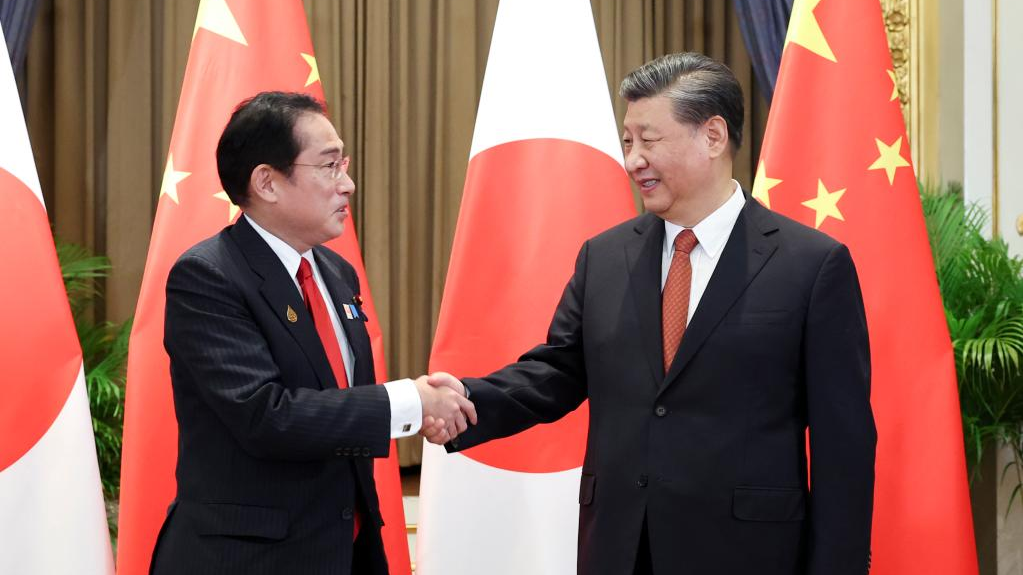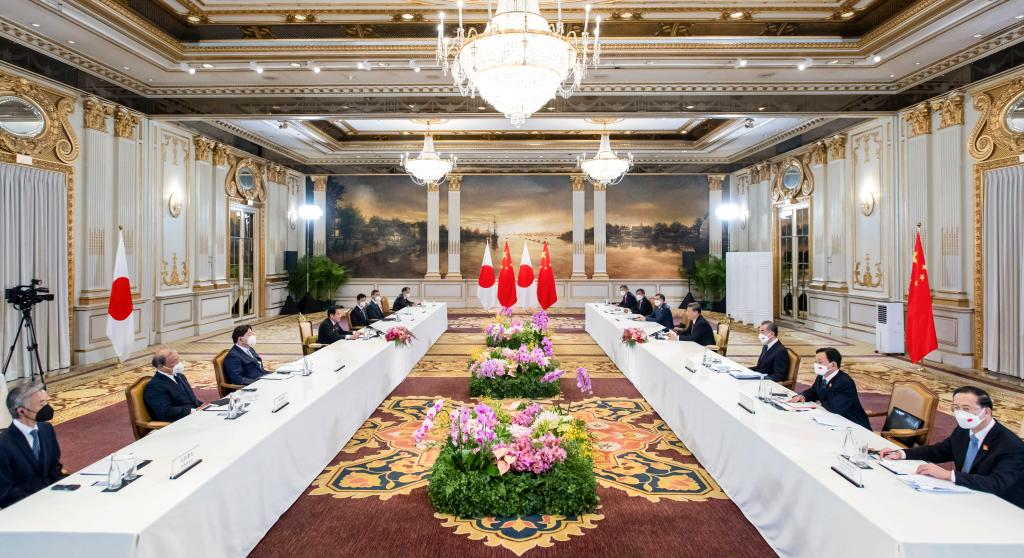
Chinese President Xi Jinping (R) meets with Japanese Prime Minister Fumio Kishida in Bangkok, Thailand, November 17, 2022. /Xinhua
Chinese President Xi Jinping (R) meets with Japanese Prime Minister Fumio Kishida in Bangkok, Thailand, November 17, 2022. /Xinhua
China and Japan have vowed to enhance political trust and deepen practical cooperation to build stable and constructive bilateral relations that meet the demands of the new era, the two countries leaders said on Thursday.
Chinese President Xi Jinping and Japanese Prime Minister Fumio Kishida met on the sidelines of the 29th Asia-Pacific Economic Cooperation (APEC) Economic Leaders' Meeting in Bangkok, Thailand.
Noting that China and Japan jointly commemorated the 50th anniversary of the normalization of bilateral relations this year, Xi said over the past five decades, the two sides have adopted the four China-Japan political documents, reached a number of important common understandings, and enjoyed fruitful exchanges and cooperation in various areas.
Facing opportunities and challenges, both sides should abide by the principles set out in the four political documents between China and Japan, continue to enhance political mutual trust and deepen mutually beneficial cooperation, and properly resolve differences and disputes under the guidance of the important consensuses already reached, Xi added.
Major issues of principle such as history and Taiwan bear on the political foundation and basic trust in China-Japan relations, and therefore must be handled in good faith and appropriately. China does not interfere in other countries' internal affairs, nor does it accept any excuse by anyone to interfere in its internal affairs, said Xi.
Xi pointed out that the two economies are highly interdependent and complementary to each other, and thus should further strengthen dialogue and coordination at all levels, such as those in the digital economy and green development, and maintain stable and unimpeded industrial and supply chains.
The two sides should continue to leverage their geographical proximity, close people-to-people ties and other unique strengths, and facilitate exchanges and communication through channels between governments, political parties, legislatures, and localities among others, Xi said.
It is particularly important to take the long view, actively carry out exchanges among the young people, foster an objective and positive perception of each other and bring the two peoples closer, said Xi.
He also urged more rapid exchanges, particularly between the next generations, as the two countries share unique advantages in terms of geographical and cultural closeness.
For his part, Kishida reaffirmed that Japan and China, as close neighbors, do not pose threats to each other, and the two countries need and should co-exist peacefully.
Japan could hardly achieve development and prosperity without China, and the same is true the other way around, said Kishida.
On the Taiwan question, there has been no change whatsoever to the commitments Japan made in the Japan-China Joint Statement, said Kishida, expressing his readiness to increase dialogue and communication with the Chinese side to jointly chart the right course for Japan-China relations.

Chinese President Xi Jinping meets with Japanese Prime Minister Fumio Kishida in Bangkok, Thailand, November 17, 2022. /Xinhua
Chinese President Xi Jinping meets with Japanese Prime Minister Fumio Kishida in Bangkok, Thailand, November 17, 2022. /Xinhua
The two sides also reached a five-point consensus on stabilizing and developing bilateral relations.
Firstly, the two sides agreed that the importance of China-Japan relations has not and will not change, and both sides need to abide by the principles of the four China-Japan political documents, follow through on the political consensus that the two countries should "be partners, not threats."
They also agreed that the two sides should intensify high-level exchanges and communication to constantly improve political mutual trust and jointly build a constructive, stable and important China-Japan relationship fit for the new era.
Secondly, the two sides agreed to hold a new round of the China-Japan High-level Economic Dialogue at an early date, strengthen cooperation in fields including energy conservation and environment protection, green development, health care and rehabilitation, as well as old-age care, and jointly provide a fair, non-discriminatory and predictable business environment for enterprises.
Thirdly, the two sides spoke highly of the series of activities commemorating the 50th anniversary of the normalization of China-Japan relations this year, agreed to hold a new meeting of the high-level consultation mechanism on people-to-people exchanges between China and Japan at an early time, and facilitate exchanges and communication through channels between governments, political parties, legislatures, localities and youth.
Fourthly, the two sides agreed to open a direct telephone line of the maritime and aerial liaison mechanism under their defense departments at an early date, improve dialogue and communication between defense and maritime departments, and jointly abide by the four-point principled agreement reached in 2014.
Fifthly, they also agreed to jointly take the responsibility for maintaining international and regional peace and prosperity, enhance coordination and cooperation in international and regional affairs, and strive to meet global challenges.
(With input from Xinhua)